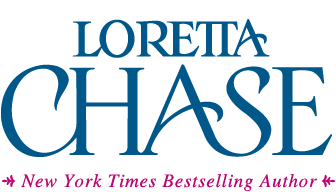HISTORICAL NOVELIST SUSAN HOLLOWAY SCOTT TALKS TO ME ABOUT THE REISSUE OF THE LAST HELLION
SUSAN: As a reader and longtime Loretta fan, I’m personally delighted to see THE LAST HELLION returning in a fresh package for new readers to discover. Would you tell us a bit about the story?
LORETTA: This was one of the cases where a secondary character intrigued me. The Duke of Ainswood makes a brief drunk and disorderly appearance in LORD OF SCOUNDRELS. That was all he was supposed to do. But he kept bugging me. What was his problem? What was he covering up or running away from? It turned out that the Duke of Ainswood is a drunken boor because he’s paid an unbearably high price for his position. But his brand of self-destruction takes him slumming--and puts him on a collision course with big, blonde, and dangerous Lydia Grenville, crusading journalist (and secret romance writer). This story is special to me because it was an opportunity to deal with some aspects of Regency life that one doesn’t encounter often in historical romances. It was a way of getting into that Dickens world I love so much while allowing both my characters to try to fight the good fight--along with fighting with each other and falling in love.
I’m terrible at summarizing my stories, so I’ll let readers look at the back cover blurb here and an excerpt here.
SUSAN: Lydia Grenville is an untraditional heroine, nearly six feet tall, nearly thirty, and full of fire and conscience. She’s also a “career woman” in a time when ladies didn’t work, let alone work as crusading journalists. What inspired you to develop her character?
LORETTA: Dickens gave me the general inspiration for the setting, and the novels he and others wrote in serial form gave me the idea for her pseudonymous ROSE OF CAIRO. But more important, Lydia is one of the many woman characters I’ve created in reaction to women in 19th C novels and to 19th C sexism and misogyny in general. Specifically, what set me off was critics’ reaction to Lady Morgan’s two-volume ITALY. You can read her response to some of the criticism here.
According to Paul Johnson’s THE BIRTH OF THE MODERN, “they hated Lady Morgan as a woman writer...and they were further incensed by the news that the publisher Colburn had paid her the immense sum of £2000 for the book. Byron hailed the book as ‘fearless and excellent.’” Everyone else went nuts. Here’s a sampling from Johnson’s book: “‘she spewed out of her filthy maw/A flood of poison, horrible and black. “She was ‘an Irish she-wolf’ a ‘blustering virago,’ a ‘wholesale blunderer and reviler’; she wrote while ‘maudlin from an extra tumbler of negus in the forenoon.’” This was typical “criticism” of the time--reviewers today are pussycats by comparison. What fascinated me me was the how much they hated her simply because she was a successful woman writer.
It was a tough world, and journalism then was definitely no place for a lady. So I got the idea of a heroine who was both a tough cookie journalist (a HIS GIRL FRIDAY kind of dame)--and a writer of highly popular romantic tales. And the two occupations reflect the two sides of her personality.
SUSAN: While Lydia is unusual, her hero, Vere Mallory, Duke of Ainswood, outwardly seems that most stereotypical character, the rakehell peer. But it only takes a few pages for readers to see the only typical thing about him is that he’s one more in a long line of deliciously unforgettable (and irresistible) heroes. What makes him so special?
LORETTA: Well, he’s a big, dumb jerk, for one thing. I love writing tough, smart, cool heroes like James Cordier of YOUR SCANDALOUS WAYS or Lord Rathbourne of LORD PERFECT. But the Regency had its cowboys, too, and creating those types of heroes (Rupert of MR IMPOSSIBLE is one of my cowboys) is a different kind of challenge, and a different kind of fun. Sometimes I think we have an overly refined image of what men were like then. There’s a great passage in Conan Doyle’s RODNEY STONE: “He was a type and leader of a strange breed of men which has vanished away from England--the full-blooded, virile buck, exquisite in his dress, narrow in his thoughts, coarse in his amusements, and eccentric in his habits.” The “coarse in his amusements” concept influenced heroes like Lord Dain and the Duke of Ainswood.
Another inspiration for this story and his character was Pierce Egan’s LIFE IN LONDON. I could easily picture Ainswood in the situations Cruikshank illustrates.



















